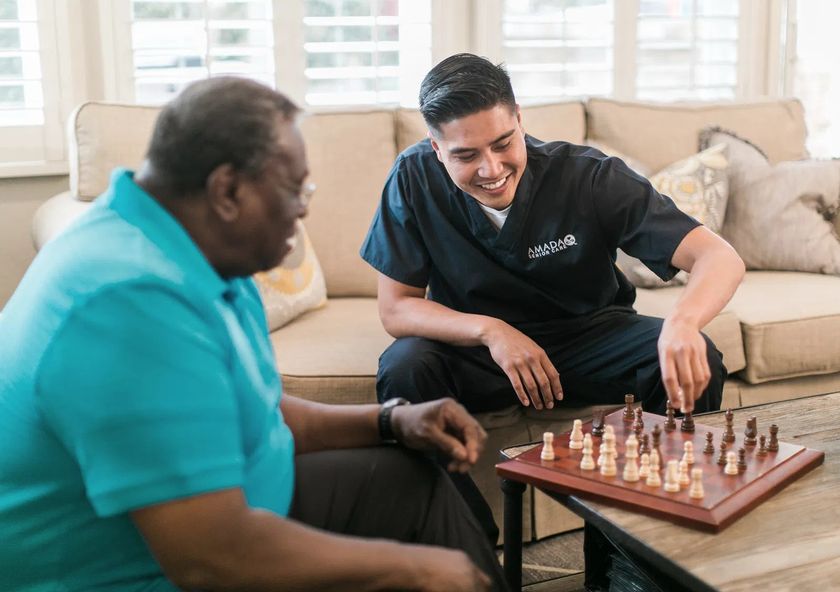- Categories :
- More
The Power of Routine: Helping Seniors Thrive

For many older adults and seniors, a reliable routine helps life feel more manageable. But as some seniors age and may start having to deal with cognitive changes, chronic conditions, or other challenges of aging, keeping a consistent routine can do far more than just organize the day. It offers many seniors a sense of stability, fosters independence, and even improves physical and emotional health.
Why Routine Matters for Seniors
Reduces Anxiety and Confusion
As we age, changes in memory and cognition can make it harder to adapt to new situations. A consistent routine eliminates the stress of decision-making and the anxiety that comes from not knowing what to expect. This is especially critical for individuals with Alzheimer’s or other forms of dementia.
According to the Alzheimer’s Association, older adults and seniors who maintain a regular daily routine often feel safer and more in control. Having a daily routine can reduce confusion and panic by creating a sense of familiarity.
Take Mary, an 82-year-old widow living with early-stage dementia. Her daughter created a daily routine that includes breakfast at 8 a.m., a walk at 9:30, crossword puzzles before lunch, a rest period in the afternoon, and a phone call with her grandson at 4 p.m. These predictable touchpoints help Mary stay grounded, reduce agitation, and give her something to look forward to.
Supports Independence
Routine empowers seniors to take ownership of their day. When the structure is clear—mealtimes, medication schedules, walks, social visits—seniors can participate more fully in their own care, reinforcing a sense of dignity and autonomy.
Encourages Healthy Habits
Scheduling daily activities around nutrition, hydration, movement, and rest encourages consistency and promotes better overall health in seniors and older adults. Regular physical activity, for example, is easier to maintain when it’s part of a set routine.
Strengthens Sleep Patterns
Older adults often experience disruptions to their circadian rhythm. A stable bedtime and waking routine, combined with consistent daytime activities, supports better sleep quality and contributes to greater energy and mood stability.
5 Tips for Creating a Supportive Routine in Senior Daily Life
Here are five caregiver-approved tips to help build a routine that works for your loved one:
Keep the Senior’s Daily Routine Simple
Start with a general structure: morning, afternoon, evening. Schedule key activities like meals, medications, hygiene, and rest at the same time each day. Leave room for flexibility.
As an example, Frank, 76, who is living with Parkinson’s disease, experiences muscle stiffness and fatigue, especially in the mornings. His caregiver, Tom, worked with a physical therapist to develop a routine that accommodates Frank’s physical limitations while maximizing his mobility.
In the morning, Frank starts the day with gentle stretching in bed, followed by breakfast and his first dose of medication. About midday, Frank and Tom take a short walk outside after lunch when Frank’s energy levels are usually higher. In the afternoon, Frank enjoys working on model airplanes or listening to jazz—activities that engage him without overexertion. Upon the evening, Frank’s predictable wind-down period is a warm shower and calming tea helps ease him into a restful night. This consistent structure minimizes Parkinson’s flare-ups and gives Frank a sense of control over his body and time.
Use Visual Aids to Maintain Daily Routine
Calendars, clocks, whiteboards, or daily printed schedules can help seniors with memory issues stay oriented and reduce confusion.
Anchor the Senior’s Day with Meaningful Activities
Include things your senior loved one enjoys or finds comforting: a morning walk, music, reading the paper, or a favorite show. These “anchors” add joy and make the day feel purposeful.
Balance Senior Activity with Rest
Too much stimulation can be overwhelming for a senior, while too little leads to boredom or sleep issues. Aim for a balance that includes light physical activity, social connection, and downtime.
Consider Grace and Harold, a married couple in their 80s who still live independently in their own home with some help from a professional caregiver. Grace is Harold’s primary caregiver. He has moderate dementia, and she has arthritis, making physical tasks harder for her. A shared daily routine helps both manage their conditions while preserving moments of connection and rest.
Grace and Harold eat breakfast together while listening to their favorite oldies playlist. At 9 a.m., the professional caregiver arrives to assist Harold with bathing and mobility exercises, giving Grace a chance to rest or run errands. About 1 p.m., both Grace and Harold nap after lunch, then spend quiet time looking at photo albums or working in the garden. The evening dinner is followed by watching a favorite classic movie—a relaxing, familiar way to end the day.
By following the same flow each day, Grace feels less overwhelmed, and Harold experiences fewer moments of confusion or agitation. Their routine supports not just care—but companionship.
Stay Consistent—But Allow for Flexibility in the Senior’s Routine
Life happens. When routines are disrupted, offer reassurance and return to the familiar schedule as soon as possible. If a routine no longer works due to changing health needs, adapt it gradually.
Routines are a Source of Senior Empowerment
Routine isn’t just a schedule—it’s a source of comfort and empowerment. When seniors know what to expect each day, they can focus their energy on enjoying life, staying connected, and aging with dignity.
If you or your loved one could benefit from a customized care routine and support from a caregiver, Amada Senior Care is here to help. Our trained caregivers work with families to develop thoughtful, consistent care plans that honor independence while offering the support that aging adults need. CLICK HERE to find an Amada office near you and request a complimentary care needs assessment.
Resources for Caregivers
Amada Senior Care – Personalized Care Plans: Amada Senior Care
Alzheimer’s Association Daily Care Tips: alz.org
National Institute on Aging – Caregiving Tips: nia.nih.gov
Family Caregiver Alliance – Routine Building: caregiver.org

















